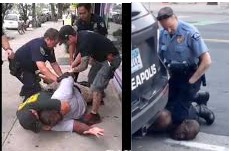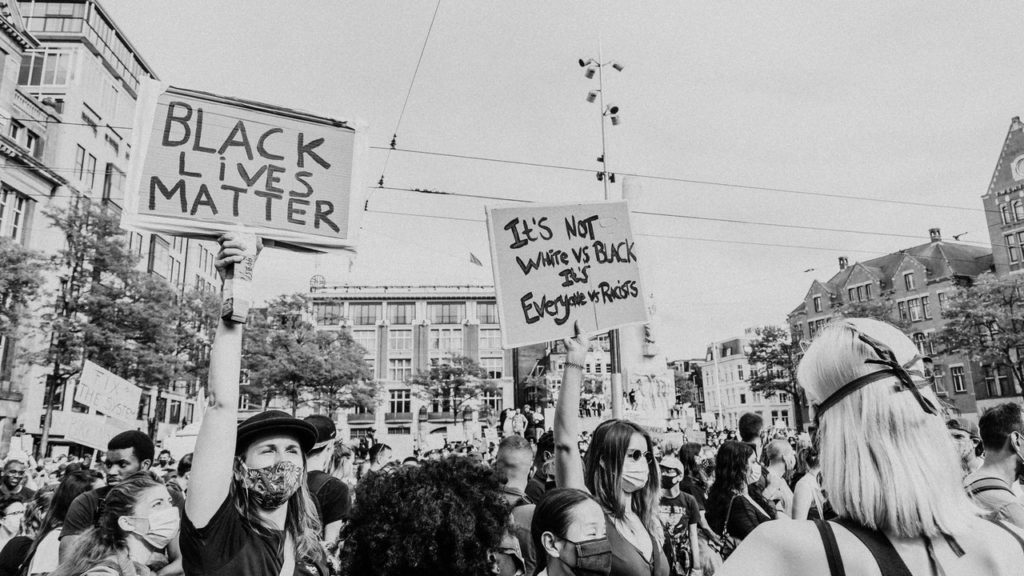This is the first essay in a series reflecting on moral dilemmas surrounding racism and how to rise above personally and collectively. It’s launched on “Juneteenth,” which marks the freedom of slaves in America.
By Liza Horan, Editor
The George Floyd incident has really shaken me to the core. Shock. Disgust. Sadness. Anger. Frustration. Disappointment.
The first rumblings of the story, a bit delayed here in the U.K., made me question what I was hearing: That the police forcibly restrained a black man on the ground, who was heard saying, “I can’t breathe…I can’t breathe…”
George? No, his name was Eric. Am I remembering this wrong? Eric Garner. And why are they talking about it now, so many years later? Did they just finally convict the cops?
The shock and horror I’ve felt since learning that this was ANOTHER incident, this time in Minneapolis not New York City, has knocked me so hard; it makes the impact of the pandemic feel like a nick while shaving.

Eric Garner died from police suffocation in 2014. In December 2019, just months before George Floyd was suffocated by police, the offending officer lost his job (not his pension). This 2014 report shows the video, President Barack Obama’s response and a protests in Missouri. This 2019 story from The New York Times reports that the case, while ruled a homicide, was dropped and no federal charges would be lodged against the police officer. USA Today shows a full five-year timeline of the Garner case. What will transpire in the five years from the Floyd case?
Not to take away from the devastation that Covid-19 has caused the bereaved friends and family of those it stole away, or the real mental, emotional and economic challenges it’s brought to individuals and to society, but there is a difference:
The pandemic is a natural yet invisible scourge. What happened to Floyd was unnatural and visible.
Those nine minutes stripped away human dignity for all involved. Sickening. Animals wouldn’t behave like this.
Yet it happened — in broad daylight, in front of witnesses, in front of the authority that’s sworn to protect the community, and committed by that authority. The man’s rap sheet is irrelevant.
And the fact that Floyd’s suffering and death — his murder — happened so many years after the same incident with Garner, I have to ask, Have we learned nothing?
It appears so, just as we have not from the pre-emptive murders of Trayvon Martin, Tamir Rice, Michael Brown, Philando Castile, and Breonna Taylor. The list goes on. And earlier this week the news contained a report of a third black man found hanging dead from a tree; the families of the men are not buying the ‘statement by suicide’ that police are offering as investigations continue.
All the outrage that the Garner incident caused, which made news beyond the five boroughs, did not make for change; it raised the volume on restarting a conversation. #BlackLivesMatter rose up, just as it did before and since.
This time, it’s worldwide. London. Paris. Berlin. Tokyo. Maybe it will make a difference this time.

PHOTO/Shane Aldendorff, Pexels
And “this time” is different: Now the U.S. has a president who sends mixed messages on racism, flaunts The Bible after tear-gassing people to clear the space for a hollow photo shoot, abuses presidential powers, leasing the public’s natural land treasures for fossil-fueled profit, and choose individualism by pulling out of the Paris Agreement for climate change and withdrawing financial support from the World Health Organization. For someone obsessed with blaming others and rejecting global collaborations as holding others accountable, he seems to do little more than congratulate himself and stoke the fires of division on many fronts.
God help us.
I’m having a tough time resolving the breadth and depth of this world in flux. People are so polarised on issues and the problems are so big, so widespread and so complex, that trying to navigate it feels akin to being ready to alight a ship for an around-the-world journey — having readied the vessel, packed the supplies, suited up in foul-weather gear, and mapped the coordinates — yet there’s heavy, still, dense fog hanging over.
How can we set off and progress under these ominous conditions?
All my thoughts, tears and toiling has led me to consider that:
- Floyd’s murder is the tip of an iceberg. It’s the sharp, pointed visible evidence of racism and police brutality. Underneath that public protrusion is a solid mass of systemic racism that has become a part of American society — invisible to many — that is held up by policies governing education, healthcare and poverty. How can we heal and make real change?
- We can’t count on authorities to do the right thing, sadly. Whether it’s protecting citizens against the pandemic, to being accountable for their words and actions, to collaborating for solutions, we’ve lost trust and hope. How can we right this situation?
- Equality starts at home. Teaching children that everyone is equal is right and noble, but when real experience falls short, it’s a hard lesson. There must be a way to gap the paradox, or is prejudice part of the human experience?
These are explored in three essays
Let’s make this a dialogue. Please comment at the bottom of this and other stories.
Write your own essay and submit it.
Part 2: How my idealism of equality was shaken by the reality of racism
America wakes up to systemic racism, and other countries can relate.
Part 3: Morality mourns the loss of leadership
Just as personal development and change come from within, the authorities must be led by the people.
Part 4: Facing the nature/nurture bias of prejudice
Have our primal instincts for survival distorted our ability to lead with heart?
What we can do
It can feel like the system is too big and the problems too entrenched to do anything. These are big mountains we are climbing, but we’ll never know the magnificent view if we don’t take a step. It comes down to each of us to do what’s in our own power to act for good. Here are five things we can do starting today:
- Vote. Educate yourself on your local, regional and federal representatives by going to their websites to read their platforms. Speak up about what you want to see in your community by emailing their offices. Register to vote (U.S. | U.K.), then tell 10 friends to do the same. When election day comes, get to your polling place and cast your vote. Keep track that their words are matched by their actions.
- Complete the census. Make sure you are being counted so the truth about populations, lifestyle habits and beliefs are represented. This informs leaders and the media about the needs and preferences of its citizens.
2020 U.S. Census | Census 2021 England & Wales | Census 2021 Scotland - Listen and share. Sharing thoughts, feelings and points of view with others goes a long way to learning, processing the goings-on, and synthesizing all the inputs to decide your stance and behaviour on matters; how you show up in the world. As many issues are politicised today, we risk further polarisation of views if we disconnect from each other. Rise above the “Us vs. Them” thinking.
- Speak up. If you witness an injustice, give the benefit of the doubt and ask for clarification. At best, the person may not realise how he or she comes across. If serious or dangerous, do call the authorities.
- Question yourself. Stay in the moment as you go about everyday tasks and conversations. Really think before speaking or acting. Ask yourself, Does this ring 100% true for me? Does it align with my values? Does this reflect who I wish to be?
- Ask for help or inspiration. Sometimes just expressing the frustration, sadness or anger in a voice recording, a handwritten journal, or a phone call can ease the burden. Other times, more is needed. Whether it’s a friend, a family member, a neighbour, a stranger, a phone helpline, a therapist, or a member of the clergy, they will be glad you did.
- Pray. For the things that seem too big, too out-of-reach or too complicated to affect, offer your positive intentions and thoughts to a higher energy. Prayers are always heard.

Comments